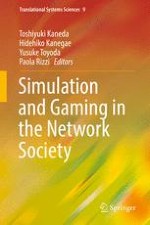2016 | OriginalPaper | Buchkapitel
Understanding the History of International Politics: A Retrospective and Repeated Type of Gaming and Simulation in the Classroom
verfasst von : Masataka Tamai, Atsushi Kondo, Noboru Miyawaki
Erschienen in: Simulation and Gaming in the Network Society
Verlag: Springer Singapore
Aktivieren Sie unsere intelligente Suche, um passende Fachinhalte oder Patente zu finden.
Wählen Sie Textabschnitte aus um mit Künstlicher Intelligenz passenden Patente zu finden. powered by
Markieren Sie Textabschnitte, um KI-gestützt weitere passende Inhalte zu finden. powered by
